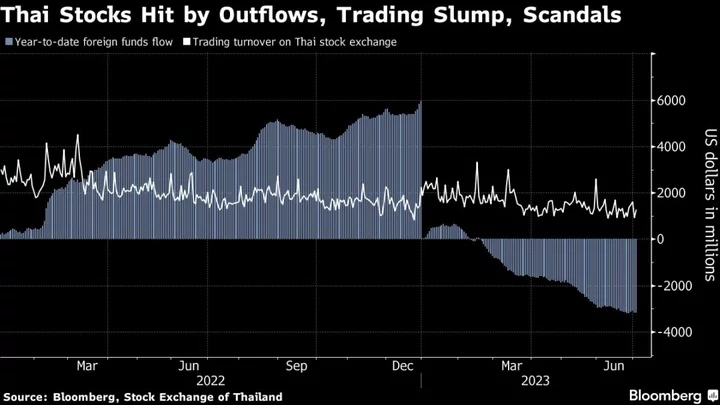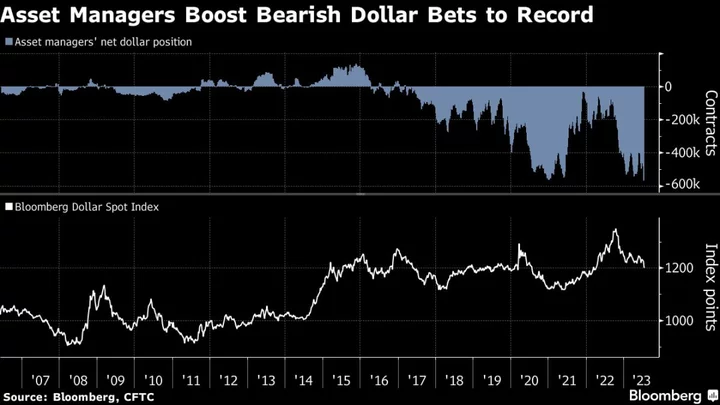The near implosion of a $2 billion company in Thailand is fueling calls from investors for tighter oversight of the country’s capital markets.
In recent months, Thailand’s financial markets have been convulsed by a spate of scandals involving some mid-sized listed companies, a tainted crypto exchange and unexplained gyrations in share prices. Now, a sudden default by wire maker Stark Corp. is leaving holders of about 39 billion baht ($1.1 billion) worth of liabilities facing imminent losses after the company disclosed accounting irregularities that also left its shares almost worthless.
The episode has created a “crisis of confidence” for investors, according to Prakit Siriwattanakage, managing director of Merchant Partners Asset Management Ltd. Already, Thailand’s benchmark SET Index had slid about 11% this year to a two-year, making it Asia’s worst performing market and near the bottom globally, as foreigners pulled some $3.3 billion from domestic equities.
It’s not unusual for investors to avoid volatility in emerging markets, but the speed of the decline in Thailand’s capital markets has rattled global funds. Traditionally the nation has had one of the highest levels of foreign investment among its peers in Southeast Asia.
Investors’ ire is now turning to the country’s chief markets regulator, the Securities and Exchange Commission, which Prakit and others view as a “trusted screener” for investments. The agency has remained mum about what it’s doing to shore up confidence, even as calls grow for it to boost oversight of Thailand’s stock markets.
Regulatory lapses and a series of scandals since late 2022 have become a thorn for investor confidence. In September, crypto exchange operator Zipmex Thailand was accused of skirting the country’s digital assets regulations. Two months later, authorities froze the assets of More Return Pcl investors due to possible fraud, according to local media reports.
But analysts do not expect tougher enforcement anytime soon. Thailand’s government is in the midst of a transition following a surprise win by Move Forward Party leader Pita Limjaroenrat. Pita is now in line to be the next prime minister, but he faces immense challenges in drumming up enough support from the Senate due to his party’s push to amend the lese majeste law. The SEC, the top regulator for bond, derivative, mutual fund and cryptocurrency markets, is unlikely to get a permanent head until a new government is in place.
Investors aren’t willing to wait. Average daily trading turnover in the second quarter tumbled about one-third compared to year ago, according to data compiled by Bloomberg. A pipeline of new share sales in Thailand that had been robust leading into 2023 has all but fizzled on concerns about political and economic uncertainty. So far this year, a total of 17 companies raised some 17 billion baht in initial share sales, lagging the 42 firms raising 128 billion baht for last year, according to exchange data.
The political and market uncertainty are threatening to hurt Thailand’s broader economy, which is already struggling with a volatile currency, lower-than-expected tourism and a weakening outlook. The latest default at Stark has also hurt the bond market, especially small and mediums-sized companies that are facing more difficulty in issuing debt securities for new funding.
“Without quick confidence restoration, companies will find it hard to raise funds for debt refinancing and business operations. That would badly hurt the economy,” said Chavinda Hanratanakool, the president of Association of Investment Management Companies, a trade group of mutual fund companies.
The SEC has defended its actions, saying that all staff have worked around the clock with other agencies on Stark and other cases to restore investor confidence. “We are doing everything to quickly bring any wrongdoers to justice and bring investors’ trust back,” SEC acting chief Thawatchai Pittayasophon told reporters last week. The country’s finance minister has echoed that concern.
On Tuesday, Stark replaced its chairman and stripped its biggest shareholder of his authority to sign company documents, according to an exchange statement. Just days later, the SEC filed charges of financial misconduct against the firm’s largest holder and others involved in management. The recent actions by the government show how serious they are about enforcement, even if the SEC is working under limited authority, according to Kobsak Pootrakool, chairman of the Federation of Thai Capital Market Organizations.
Thai authorities are also planning to tighten listing rules, including lifting the percentage of free-float companies have to offer and the threshold of a company’s profitability and shareholder equity. Still, many investors remain concerned about how quickly regulators will be able to stem further fallout and prevent similar occurrences in the future from dragging down markets or the economy.
“International investors are looking closely at how the authorities are improving their supervisions and cooperations,” said Niwes Hemvachiravarakorn, investor and founder of Thai Value Investor Club. “If they lose the trust, it will be a big problem and take times to bring it back.”









